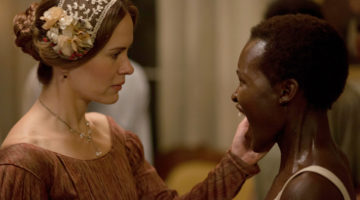5 Questions with Allan Scott
Allan Scott, co-writer of Don’t Look Now, will be presenting the film in conversation with Eleanor Wachtel Monday, May 11th as a part of TIFF’s adult learning program Books on Film. There are two really excellent reasons to attend this particular installment of the program.
First off, Don’t Look Now has been in the news a lot lately with talk of a remake, (which was announced after we spoke with Scott via email), and a prominent appearance in this year’s Sundance favourite Me, Earl, and The Dying Girl. Secondly, Scott himself, educated in Canada is an incredible conversationalist. His answers to our questions were mind-boggling, and having him in person with whom to watch this essential film should be a great experience.
Scene Creek: Did you imagine that when you first started to adapt the book that Don’t Look Now would become the cultural phenomenon that it ended up becoming?
Allan Scott: Certainly not – who can ever know that their film is going to be likeable let alone successful. I once co-produced a Canadian film called Grizzly Falls with Toronto producer Peter Simpson. We liked it, but had no idea really. Then we held a screening in California with test cards for the audience. I was sitting at the back. The marketing guy got onstage after the film was screened and asked the audience to raise their hand if they’d rated the movie above 80%. The entire audience raised their hands. And brought tears to my eyes because it was the first (and just about only!) validation that we had succeeded in what we attempted to do.
With Don’t Look Now, despite having been on set a lot – though not for the love scene which no outside person attended despite claims to the contrary: no one – the first time I saw the assembled film, I was blown away because it was the first time it had been printed in colour! All the rushes were in black and white, so you can imagine how amazing it was to sit and see the entire story in the dazzling colours for which the film became known.
It became (in your words) a “cultural phenomenon” because it dealt with important themes and took them both seriously and dramatically. The film is often voted in the top five British movies ever made and one remains both flattered and surprised. But I think it still speaks with a contemporary voice.
Scene Creek: This was a short story and not a fully fleshed-out tale and yet you adapted the story into a full-length film. Did you feel like you had the means to expand on the story or was that not as much of a concern?
Allan Scott: The principal concern in writing the first screenplay of any project is: is there enough to tell a story as a full length movie? And, yes, it was at first a concern that the short story didn’t have enough elements to fill a ninety minute feature. But as we worked on the screenplay (the late Chris Bryant, a Canadian lawyer, and I) the detail began to fill in: devising the hero’s job as being one where he worked in Venice helped a great deal. Simply filling out the scenes with the blind woman and her sister gave breadth and depth. The opening sequence was an entirely new element. The hero’s architectural work and relationship with the Bishop was original. The love scene. The more we introduced, the more we became confident that there was more than enough material. The scene in church where the scaffold collapses was literally added because we thought the story got a bit slow around there. But once devised, it was easy to integrate that into both John Baxter’s story and the Bishop’s story.
SC: There are themes that emerge from the story in the film, specifically the Freudian elements of sex and death. Do you see those arriving from the short story, your adaption, or Roeg’s directing?
AS: We were a bit nervous showing the movie to Daphne DuMaurier and I think I am correct in recalling that, on the advice of her son, we deleted the love scene from that showing. She must have been surprised at all the fuss subsequently raised about it. This fuss included a well-known actor getting hold of a senior studio executive and demanding that the scene be removed. I hope he regrets his actions today.
I’m not sure one can separate the “Freudian” elements from any other. Freud was about life, death and sex. But life is about life, death and sex. In fact a Scottish academic wrote an entire book entitled (something like) “Don’t Look Now – a Jungian interpretation.” So Freud doesn’t have the field to himself!
SC: Do you see this story as Gothic horror, a thriller, an examination of the uncanny and vision, Hitchcock-like, or perhaps an an amalgamation of all of the above?
AS: I think I would describe it as amalgamation of these elements even though there is little actual gothic horror except in one scene towards the end. At heart it’s about a couple surviving their private grief and how those who believe in psychic phenomena are able to exploit grief. It’s also about second-sight. Which may just be coincidence but when the coincidence occurs, it surely seems to be second sight. We made a deliberate attempt to unsettle the viewer and this resulted in an interesting kind of suspense. The hotel closes down and they are pushed out – just at the time when they need some stability. The paths of a murderer and the grieving family cross – pure coincidence – which seems driven by something more sinister.
SC: Does your work at the Macallan distillery connect to screenwriting or are they entirely disparate experiences? Perhaps there is another voyage after Kon-Tiki, (a film for which Scott worked a as a script consultant)?
AS: My work in the world of business had no connection whatever with my work in the film industry. Except, I suppose, it helped me not to be driven by Hollywood’s main drivers – fear and greed. My work as a writer did help with the whisky company’s marketing and advertising campaigns where only years of experience can help you to reduce and edit a marketing message to a concise or focused result. I’m currently revising the screenplay of my long-held passion project: Walter Tevis’ novel The Queen’s Gambit. The last director I had attached to it had just finished working on the script with me and was deep into casting when, very sadly, he died. He was Heath Ledger, a lovely guy promising to be a talented first time director. It’s a wonderful project but needs a director of real talent to fit the usual ten gallons into a pint pot.
The directors of Kon-Tiki and I are looking for another project to do together. They are off earning money on the next episode of Pirates of the Caribbean so I have to wait for them to get past that in order to work for very little once again!




